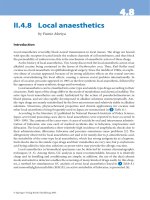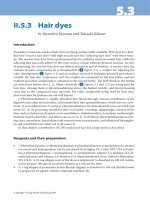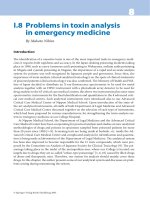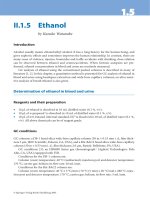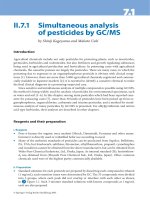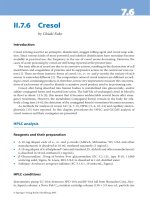Handbook of Couples Therapy pdf
Bạn đang xem bản rút gọn của tài liệu. Xem và tải ngay bản đầy đủ của tài liệu tại đây (3.84 MB, 506 trang )
TeAM
YYePG
Digitally signed by TeAM YYePG
DN: cn=TeAM YYePG, c=US,
o=TeAM YYePG, ou=TeAM
YYePG, email=
Reason: I attest to the accuracy
and integrity of this document
Date: 2005.07.08 13:29:58
+08'00'
Handbook of
Couples Therapy
ffirs.qxd 10/29/04 3:59 PM Page i
ffirs.qxd 10/29/04 3:59 PM Page ii
Handbook of
Couples Therapy
Edited by
Michele Harway
John Wiley & Sons, Inc.
ffirs.qxd 10/29/04 3:59 PM Page iii
This book is printed on acid-free paper.
Copyright © 2005 by John Wiley & Sons, Inc. All rights reserved.
Published by John Wiley & Sons, Inc., Hoboken, New Jersey.
Published simultaneously in Canada.
No part of this publication may be reproduced, stored in a retrieval system, or transmitted in any
form or by any means, electronic, mechanical, photocopying, recording, scanning, or otherwise,
except as permitted under Section 107 or 108 of the 1976 United States Copyright Act, without
either the prior written permission of the Publisher, or authorization through payment of the
appropriate per-copy fee to the Copyright Clearance Center, Inc., 222 Rosewood Drive, Danvers,
MA 01923, (978) 750-8400, fax (978) 646-8600, or on the web at www.copyright.com. Requests to
the Publisher for permission should be addressed to the Permissions Department, John Wiley &
Sons, Inc., 111 River Street, Hoboken, NJ 07030, (201) 748-6011, fax (201) 748-6008.
Limit of Liability/Disclaimer of Warranty: While the publisher and author have used their best
efforts in preparing this book, they make no representations or warranties with respect to the
accuracy or completeness of the contents of this book and specifically disclaim any implied
warranties of merchantability or fitness for a particular purpose. No warranty may be created or
extended by sales representatives or written sales materials. The advice and strategies contained
herein may not be suitable for your situation. You should consult with a professional where
appropriate. Neither the publisher nor author shall be liable for any loss of profit or any other
commercial damages, including but not limited to special, incidental, consequential, or other
damages.
This publication is designed to provide accurate and authoritative information in regard to the
subject matter covered. It is sold with the understanding that the publisher is not engaged in
rendering professional services. If legal, accounting, medical, psychological or any other expert
assistance is required, the services of a competent professional person should be sought.
Designations used by companies to distinguish their products are often claimed as trademarks.
In all instances where John Wiley & Sons, Inc. is aware of a claim, the product names appear in
initial capital or all capital letters. Readers, however, should contact the appropriate companies
for more complete information regarding trademarks and registration.
For general information on our other products and services please contact our Customer Care
Department within the United States at (800) 762-2974, outside the United States at
(317) 572-3993 or fax (317) 572-4002.
Wiley also publishes its books in a variety of electronic formats. Some content that appears in
print may not be available in electronic books. For more information about Wiley products, visit
our web site at www.wiley.com.
Library of Congress Cataloging-in-Publication Data:
Handbook of couples therapy / edited by Michele Harway.
p. cm.
Includes bibliographical references.
ISBN 0-471-44408-1 (cloth: alk. paper)
1. Marital psychotherapy—Handbooks, manuals, etc. I. Harway, Michele.
RC488.5.H3263 2005
616.89′1562—dc22
2004042252
Printed in the United States of America.
10987654321
➇
ffirs.qxd 10/29/04 3:59 PM Page iv
v
Acknowledgments
C
OMPLETING A VOLUME
like this is accompanied by a variety of feel-
ings. T
he main one is relief at being able to take the manuscript off
my desk, although knowing how busy I get, my desk will probably
stay clean for a grand total of about 50 seconds. Closely following the re-
lief is the sense of gratitude that I feel toward a myriad of people who
were involved in helping me complete this project. I first want to thank
Dr. Florence Kaslow who encouraged me to develop this edited volume and
who was instrumental in convincing Wiley to publish it. Dr. Kaslow has al-
ways been a wonderful role model and professional cheerleader for me.
The staff of John Wiley & Sons, particularly Isabel Pratt and Peggy
Alexander (who stepped in when the original editor changed positions), are
much appreciated.
During the time I was developing the concept behind the book and invit-
ing chapter authors, I was going through a difficult professional transition
and I want to thank all of my friends at the Phillips Graduate Institute who
were my sounding boards and dear, “family members.” I won’t mention
you all by name, but I think you know who you are, and I hope you know
that I care about you deeply.
Since joining the faculty at Antioch University, Santa Barbara, I have
found a wonderfully supportive group of colleagues and new friends. I
want to particularly thank Dr. Catherine Radecki-Bush who tolerated my
brief moments of insanity as I completed this task. Cathy also was helpful
to me in my work by asking me to teach a class on couples therapy, knowing
perhaps that preparing for the class would crystallize some important rele-
vant ideas.
Finally, I would like to thank the many couples I have been honored to
work with clinically over the years. I have learned so much from you!
And to my husband Bruce Antman who has always maintained that any
relationship is salvageable as long as both members of the couple are will-
ing to do whatever it takes to make it work, I say, “I agree.”
M
ICHELE
H
ARWAY
, P
H
D
ffirs.qxd 10/29/04 3:59 PM Page v
ffirs.qxd 10/29/04 3:59 PM Page vi
vii
Contents
About the Contributors ix
1. Setting the Stage for Working with Couples 1
Michele Harway
S
ECTION
IL
IFE
C
YCLE
S
TAGES
2. Premarital Counseling from the PAIRS Perspective 7
Lori H. Gordon, Robin Rose Temple, and Donald W. Adams
3. The First Years of Marital Commitment 28
William C. Nichols
4. Couples with Young Children 44
Linda Morano Lower
5. Couples with Adolescents 61
C. Haydee Mas and James F. Alexander
6. Therapy with Older Couples: Love Stories—The Good,
the Bad, and the Movies 80
Thomas H. Peake and Angela E. Steep
S
ECTION
II T
HEORETICAL
P
ERSPECTIVES ON
W
ORKING WITH
C
OUPLES
7. Bowen Family Systems Theory as Feminist Therapy 103
Louise Bordeaux Silverstein
8. Cognitive Behavioral Couple Therapy 119
Terence Patterson
9. Object Relations Couple Therapy 141
David E. Scharff and Yolanda de Varela
10. Narrative Therapy with Couples: Promoting Liberation from
Constraining Influences 157
Lynne V. Rosen and Charley Lang
11. EFT: An Integrative Contemporary Approach 179
Brent Bradley and Susan M. Johnson
ftoc.qxd 10/29/04 3:59 PM Page vii
viii C
ONTENTS
12. Strategic and Solution-Focused Couple Therapy 194
Stephen Cheung
13. Integrative Healing Couples Therapy: A Search for
Self and Each Other 211
Patricia Pitta
14. Feminist and Contextual Work 228
Roberta L. Nutt
S
ECTION
III S
PECIAL
I
SSUES
F
ACED BY
C
OUPLES
15. Managing Emotional Reactivity in Couples Facing
Illness: Smoothing Out the Emotional Roller Coaster 253
William H. Watson and Susan H. McDaniel
16. Treating Couples with Sexual Abuse Issues 272
Michele Harway and Ellen Faulk
17. Working with Couples Who Have Experienced
Physical Aggression 289
Amy Holtzworth-Munroe, Kahni Clements, and Coreen Farris
18. Couples and Addiction 313
Mark Stanton
19. Infidelity: Theory and Treatment 337
Don-David Lusterman
20. Religious and Spiritual Issues in Couples Therapy 352
Ilene Serlin
21. Working with Same-Sex Couples 370
Daniel J. Alonzo
22. Treating Couples across the Socioeconomic Spectrum 386
Florence W. Kaslow
23. Divorcing Couples 405
Joy K. Rice
24. What the Research Tells Us 431
Sally D. Stabb
25. Some Concluding Thoughts about Couples and
Couples Therapy 457
Michele Harway
Author Index 461
Subject Index 475
ftoc.qxd 10/29/04 3:59 PM Page viii
ix
About the Contributors
D
onald W. Adams, PhD, earned his doctorate in clinical psychology
from Duke University. After three years as director of Children’s
Service in a rural North Carolina Mental Health Center and an-
other three years as director of Psychological Services at Dorothea Dix
Hospital Inpatient Adolescent Treatment Program, he began, in 1981, full
time private practice in Cary, North Carolina. Dr. Adams specialized in
play therapy and taught seminars and conducted conference workshops on
child psychotherapy in the 1980s. His practice has been consistently ori-
ented toward the healthy adjustment of children and families. He has been
active in the North Carolina Psychological Association and served as presi-
dent in 1995/1996. He and his wife, Jo, a psychiatric nurse specialist, were
trained in PAIRS in 1993. He refocused much of his professional energy to-
ward treating troubled relationships and teaching relationship skills. He
has taught many aspects of PAIRS and has been active in developing and
refining PAIRS programs. He is currently the vice president of the PAIRS
Foundation and serves on the executive board and steering committee of
PAIRS. Dr. Adams co-authored a chapter on sensuality and sexuality in
Building Intimate Relationships.
James F. Alexander, PhD, is the progenitor (with B. V. Parsons) of func-
tional family therapy (FFT), a nationally and internationally acclaimed
and empirically demonstrated intervention model for juvenile delinquents,
oppositional and conduct-disordered youth, and substance abusing youth.
Since 1968, he has been on the faculty at the University of Utah. He is the
2001 recipient of the Distinguished Award for Lifetime Contributions to
Family Therapy Research of the American Association for Marriage and
Family Therapy. Dr. Alexander is the author of over 90 chapters and refer-
eed journal articles, two books, and over 150 convention presentations and
academic colloquia. He has also presented at over 300 national and interna-
tional clinical training workshops.
Daniel J. Alonzo, MA, is a member of the core faculty at Phillips Graduate In-
stitute in Encino, California. He is a member of the Society for the Scien
tific
flast.qxd 10/29/04 4:01 PM Page ix
xA
BOUT THE
C
ONTRIBUTORS
Study of Sexuality (SSSS) and has presented papers at the SSSS Western
Regional Conferences and the Los Angeles SSSS Chapter. He is also a mem-
ber of the American Association of Sex Educators, Counselors, and Thera-
pists (AASECT), and he is an AASECT Certified Sex Therapist. In addition,
he is an American Association for Marriage and Family Therapy Approved
Supervisor and a California Association of Marriage and Family Therapy
Certified Supervisor, providing supervision, training, workshops, and con-
sultation with mental health agencies in the Los Angeles area. He has been
a California Licensed Marriage and Family Therapist for more than 13
years, specializing in sexual minority mental health, couple therapy, and
working with same-sex couples.
Brent Bradley, PhD, is assistant professor of counseling and director of the
marriage and family therapy track in the Graduate Counseling Department
at Indiana Wesleyan University. He received his doctorate in Marriage and
Family Therapy from Fuller Seminary School of Psychology in 2001. He is
a clinical member of the American Association for Marriage and Family
Therapy. Dr. Bradley has published original research in emotionally fo-
cused couples therapy (EFT), and actively researches, writes, and presents
the approach.
Stephen Cheung, PsyD, is an interim core faculty of clinical psychology at
Antioch University in Los Angeles. He is teaching Brief Therapy, Family
Therapy, Group Therapy, and Psychological Testing. Before he joined An-
tioch University in 2004, Dr. Cheung had been a program director and
clinical psychologist at Asian Pacific Counseling and Treatment Centers
(APCTC) in Los Angeles coordinating and supervising their children and
adult programs for 12 years. For almost three decades, he has been
providing short-term and longer-term psychotherapy to a wide variety of
clients. He has specialized in: Eating, Substance-related, Personality,
Mood, and Anxiety Disorders; grief therapy; and psychological testing.
Since 1996, he has been teaching at Phillips Graduate Institute, California
State University at Los Angeles, and Pepperdine University. He has also
been presenting training in strategic and solution-focused brief therapy,
an integrated treatment approach to eating disorders, and psychotheray
with childhood abuse survivors in local, national, and international men-
tal health conferences.
Kahni Clements received her BA in psychology from the University of Cal-
ifornia at Los Angeles. She is currently a graduate student in clinical psy-
chology at Indiana University-Bloomington. Her research interests are
relationship violence and couples communication interactions.
Yolanda de Varela, PhD Candidate, is a clinical psychologist with a master’s
degree in educational psychology and is completing her doctorate. She has
flast.qxd 10/29/04 4:01 PM Page x
About the Contributors xi
been president of the Panamanian Psychological Association, a founding
member of the International Institute of Object Relations Therapy, and direc-
tor of the Panama Satellite Program of IIORT. She is author and co-author of
many articles on object relations and on couples therapy.
Coreen Farris received her BA in psychology from Brandeis University. She
is a graduate student in clinical psychology at Indiana University-Bloom-
ington. Her research interests are in substance use and aggression.
Ellen Faulk, MA, is a faculty member at Phillips Graduate Institute in En-
cino, California. She is a member of the California Association of Marriage
and Family Therapists, the American Association for Marriage and Family
Therapy, and a student member of the American Psychological Association.
Ms. Faulk provides training, workshops, and consultation for mental health
providers on working with adult survivors of sexual abuse. She has been a
consultant to the Los Angeles Police Department and the Los Angeles Fed-
eral Bureau of Investigation. Ms. Faulk is a practicing marriage and family
therapist specializing in traumatized populations.
Lori H. Gordon, PhD, is founder/president/training director of the PAIRS
Foundation, Inc. and serves as chief executive officer of the executive board.
She conducts a private clinical practice through the Family Relations Insti-
tute, Falls Church, Virginia, and consults through Tequesta Consulting
Services, Ltd. in Fort Lauderdale, Florida. She is the author of three popular
books: Love Knots, Passage to Intimacy, and If You Really Loved Me. She is also
co-author of two professional articles on the PAIRS program as well as a
range of professional training curricula, articles, and materials. She contin-
ues to develop relationship programs through the PAIRS Foundation that
are designed to sustain healthy marriages and stable families. Dr. Gordon
trains health care professionals and selected public worldwide to teach the
range of PAIRS programs.
Michele Harway, PhD, ABPP, is a member of the core faculty in the Psy-
chology Department at Antioch University, Santa Barbara. She is also a
member of the consulting faculty at the Fielding Graduate Institute and
she maintains a private practice in Westlake Village, California. Dr. Har-
way has written and presented extensively on domestic violence, trauma
survival, gender, and family issues. She is the author or editor of eight
books including Treating the Changing Family: Handling Normative and Un-
usual Events and Spouse Abuse: Assessing & Treating Battered Women, Batterers,
and Their Children (Second Edition). Active in governance of the American
Psychological Association (APA), she is past-president of the Division of
Family Psychology and current treasurer of the Society for the Study of
Men and Masculinity. She is a fellow of three divisions of APA and is also
a board-certified family psychologist (ABPP).
flast.qxd 10/29/04 4:01 PM Page xi
xii A
BOUT THE
C
ONTRIBUTORS
Amy Holtzworth-Munroe, PhD, is a professor of psychology at Indiana
University, Bloomington. She received her doctorate in clinical psychology
from the University of Washington. For almost 20 years, she has conducted
research on the problem of husband violence, comparing the social skills of
violent and nonviolent husbands and examining the marital interactions
of violent couples. Her more recent research focuses on subtypes of male
batterers. She has led batterer treatment groups and worked with a local
domestic violence task force to set up a batterers’ treatment program.
Dr. Holtzworth-Munroe teaches a couples therapy practicum for graduate
students. She is past associate editor of Journal of Consulting and Clinical Psy-
chology and Cognitive Therapy and Research and a past member of NIH grant
review panels in the area of family violence.
Susan M. Johnson, PhD, is professor of psychology and psychiatry at Ot-
tawa University and director of the Ottawa Couple and Family Institute.
She received her doctorate in counseling psychology from the University of
British Columbia. She is a registered psychologist in the province of On-
tario, Canada, and a member of the editorial board of the Journal of Marital
and Family Therapy, the Journal of Couple and Relationship Therapy, and the
Journal of Family Psychology. She is one of the originators and the main pro-
ponent of emotionally focused couples therapy, now one of the best vali-
dated couples’ approaches in North America.
Florence W. Kaslow, PhD, ABPP, is in independent practice as a psycholo-
gist, coach, family business consultant, and mediator in Palm Beach County,
Florida. She is also director of the Florida Couples and Family Institute; an
adjunct professor of medical psychology, Department of Psychiatry at Duke
University Medical School in Durham, North Carolina; and a visiting profes-
sor of psychology at Florida Institute of Technology in Melbourne, Florida.
Dr. Kaslow is board certified in clinical, family, and forensic psychology
from the American Board of Professional Psychology (ABPP), and in sexol-
ogy from the American Board of Clinical Sexology. Dr. Kaslow is a fellow of
Divisions 12, 29, 41, 42, 43, and 46 of the American Psychological Associa-
tion, the American Association for Marriage and Family Therapy (AAMFT),
and other organizations. She has edited, authored, or co-authored
19 books
and has contributed chapters to more than 50 other books. Over 150 of her
articles have been published in professional journals here and abroad. She is
also on the editorial boards of numerous journals in psychology and family
psychology. Dr. Kaslow has received numerous honors in psychology, family
psychology, and international psychology.
Charley Lang, MA, MFT, has a private practice in Los Angeles. He also
teaches Narrative Therapy at Antioch University, Los Angeles, and super-
vises the mental health staff at the AIDS Service Center in Pasadena. He
produced and directed the award-winning documentary films Live to Tell:
flast.qxd 10/29/04 4:01 PM Page xii
About the Contributors xiii
The First Gay and Lesbian Prom in America, Battle for the Tiara, and Gay Cops:
Pride Behind the Badge.
Linda Morano Lower, MS, MA, LMFT, holds masters degrees in both mar-
riage and family therapy and ascetical theology from California Lutheran
University and Fordham University, respectively. She has been in private
practice as a marriage and family therapist for 17 years in Camarillo and
Westlake Village, and she specializes in working with couples at all stages of
their life cycles. Linda lives in Camarillo, California, where, with her thera-
pist husband, she is parenting two teen-aged daughters.
Don-David Lusterman, PhD, is the author of Infidelity: A Survival Guide and
co-editor of Casebook for Integrating Family Therapy: An Ecosystemic Approach
and Integrating Family Therapy: Handbook of Family Psychology and Systems The-
ory as well as several other books, book chapters, and articles. He also serves
as consulting editor for the Journal of Family Psychology and is on the editorial
board of The American Journal of Family Therapy. He founded the program in
family counseling at Hofstra University in 1973 and served as its coordinator
until 1980. He was also the founding executive director of the American
Board of Family Psychology (now part of the American Board of Professional
Psychology) and holds an ABPP Diplomate in family psychology. He is a fel-
low of APA’s divisions of Family Psychology, Psychotherapy, Independent
Practice, Media Psychology, and Men and Masculinity. He is also a fellow
and approved supervisor for the American Association for Marriage and
Family Therapy. He is a charter member of the American Family Therapy
Academy on whose board he also serves. Dr. Lusterman is in private practice
in Baldwin, New York.
C. Haydee Mas, PhD, did her undergraduate work at the University of
Michigan and her graduate studies in clinical psychology at the University
of Utah where she was chairperson of the graduate student minority com-
mittee. Her research interests and publications have focused on therapist-
client communication styles, FFT process studies, support systems in
abusive families, as well as family communication and attributional styles
in families with an adolescent. She is currently in private practice working
with couples and families with adolescents and children, and she conducts
therapy in Spanish with bilingual and bicultural clients and families.
Susan H. McDaniel, PhD, is professor of psychiatry and family medicine,
director of the Division of Family Programs and the Wynne Center for
Family Research in Psychiatry, and associate chair of the Department of
Family Medicine at the University of Rochester School of Medicine and
Dentistry in Rochester, New York. She has many publications in the areas
of
medical family therapy, family-oriented primary care, and supervision and
consultation. Her special areas of interest are family dynamics and genetic
flast.qxd 10/29/04 4:01 PM Page xiii
xiv A
BOUT THE
C
ONTRIBUTORS
testing, somatization, and gender and health. She is a frequent speaker at
meetings of both health and mental health professionals. Dr. McDaniel is
co-editor, with Thomas Campbell, MD, of the multidisciplinary journal,
Families, Systems and Health, and serves on many other journal boards. She
co-authored or co-edited the following books: Systems Consultation, Family-
Oriented Primary Care, Medical Family Therapy, Integrating Family Therapy,
Counseling Families with Chronic Illness, The Shared Experience of Illness, Inte-
grating Family Therapy, and the Casebook for Integrating Family Therapy. Some
books have been translated into several languages; an additional volume is
exclusively in German.
Dr. McDaniel was chair of the Commission on Accreditation for Marriage
and Family Therapy Education in 1998, president of the Division of Family
Psychology of the American Psychological Association (APA) in 1999, and
chair of the APA Publications and Communications Board in 2002. Dr. Mc-
Daniel
was recognized by the APA as the 1995 Family Psychologist of the
Year. In 1998, she was the first psychologist to be a fellow in the Public
Health Service Primary Care Policy Fellowship. She also won the Postdoc-
toral Academic Mentoring Award from her medical school in 1998, and in
2000 she received the award for Innovative Contributions to Family Ther-
apy from the American Family Therapy Academy.
William C. Nichols, EdD, ABPP, is a marital and family therapist and
diplomate in clinical psychology, a fellow, clinical member, and approved
supervisor of the AAMFT; a charter member of both the American Family
Therapy Academy and the International Family Therapy Association
(IFTA); and a fellow of both the American Psychological Association and
the American Psychological Society. He was in full-time private practice
for nearly 25 years and taught and supervised postdoctoral, doctoral, and
masters’ students in MFT programs and postdegree professionals for 35
years at Florida State University, the Merrill-Palmer Institute, and else-
where. Founder and first editor of the Journal of Marital and Family Therapy,
he also edited Family Relations, and currently edits Contemporary Family
Therapy. He has written or edited eight MFT and therapy books, conceptu-
alized and launched MFT accreditation, wrote the first model licensing
laws, co-wrote the national licensing examination, and chaired a state li-
censing board for seven years. He has been president of the AAMFT, IFTA,
and the National Council on Family Relations.
Roberta L. Nutt, PhD, ABPP, is the founder and director of the counseling
psychology doctoral program that emphasizes family psychology and
women’s/gender issues at Texas Women’s University. She is co-author of
the “Division 17 Principles Concerning the Counseling/Psychotherapy of
Women: Rationale and Implementation” and Bridging Separate
Gender
Worlds: Why Men and Women Clash and How Therapists Can Bring Them
To-
gether. Dr. Nutt has written and presented extensively on gender and
flast.qxd 10/29/04 4:01 PM Page xiv
About the Contributors xv
family issues, served in a number of leadership roles in psychology including
president of the Family Psychology Division of APA and held offices in both
the women’s and men’s divisions. She holds the ABPP diplomate in family
psychology. She is currently co-chairing an APA Interdivisional Task Force
developing new guidelines for psychological practice with girls and women.
Terence Patterson, EdD, ABPP, is professor and director of the doctoral
program in counseling psychology at the University of San Francisco. He is
a licensed psychologist and is board certified in family psychology with the
American Board of Professional Psychology. His specialties are family psy-
chology, ethical issues, and theoretical orientation in psychotherapy. He is
on the boards of a number of professional journals and has authored Vol. II
(Cognitive-Behavioral) of the Comprehensive Handbook of Psychotherapy, and the
Couple & Family Clinical Documentation Sourcebook. Dr. Patterson has served
as president of the Division of Family Psychology of the American Psycho-
logical Association and is a fellow of APA.
Thomas H. Peake, PhD, ABPP, is professor and associate dean for the School
of Psychology at Florida Institute of Technology (Melbourne), and adjunct
professor in the Department of Aging and Mental Health of the Florida In-
stitute of Mental Health of the University of South Florida (Tampa). Li-
censed in Virginia, Michigan, Florida, and chartered in Great Britain, he has
practiced clinical, health, and family psychology for over 15 years. He is a
diplomate (ABPP) in both clinical and health psychology and is an approved
supervisor for AAMFT. Dr. Peake’s publication and practice areas include
books and articles on brief psychotherapies, clinical training and supervi-
sion, couples therapy, medical/health psychology, healthy aging, and a book
Cinema and Life Development: Healing Lives and Training Therapists.
Patricia Pitta, PhD, ABPP, is a board-certified family psychologist. She re-
ceived her doctorate from Fordham University and completed postdoctoral
training in family therapy at the Center for Family Learning, Ryebrook,
New York. In addition, she holds a degree in pastoral formation which en-
ables her to integrate spirituality with psychology. For the past 10 years,
Dr. Pitta has been a professor of psychology in the doctoral and postdoc-
toral training programs at St. John’s University. As developer of Integrative
Healing Family Therapy, Dr. Pitta has published many articles about the
theory and its applications. She has also produced a video entitled “Parent-
ing Your Elderly Parents” (published by APA Publications) and is the au-
thor of a marital therapy manual (published by Division 42 of APA).
Joy K. Rice, PhD, is clinical professor of psychiatry and Emerita Professor
of Educational Policy and Women’s Studies at the University of Wisconsin–
Madison. She also maintains an active psychotherapy practice with Psychi-
atric Services in Madison. Her research activity includes more than 100
flast.qxd 10/29/04 4:01 PM Page xv
xvi A
BOUT THE
C
ONTRIBUTORS
na
tional and international presentations and publications on family change,
poverty, and mental health. Living through Divorce: A Developmental Approach
to Divorce Therapy, written with Dr. David Rice, was honored as a Book-of-
the-Month selection.
Active in international psychology, Dr. Rice is secretary of the Interna-
tional Council of Psychologists, chair elect of the APA Committee on Inter-
national Relations in Psychology, and president elect of APA Division 52,
International Psychology. She has received numerous awards and honors for
her research and social policy work on behalf of disadvantaged families and
women nationally and internationally. She is a recipient of the Educational
Press Association Distinguished Achievement Award, a fellow of the Amer-
ican Psychological Association, and is listed in Who’s Who of Women and
the World’s Who’s Who of Women.
Lynne V. Rosen, LCSW, is core faculty and director of the Post Modern
Therapy Training Program at Phillips Graduate Institute in Encino, Cali-
fornia. She is interested in collaborative education and integrating her pas-
sion and commitment to diversity and social justice in training and
teaching contexts. Ms. Rosen is co-founder of Women’s Project Los Angeles
(WPLA), a community-based project focused on social constructionist and
feminist ideas. WPLA utilizes innovative forms of dialogue in order to
bring forward new perspectives and possibilities that can lead to meaning-
ful change in women’s lives. She maintains a private practice and has a
long-standing interest in working with women who are taking their lives
back from eating problems, abuse, and trauma and in working with couples
and families.
David E. Scharff, MD, is a psychiatrist and psychoanalyst. He is co-director
of the International Psychotherapy Institute, Washington, DC. Dr. Scharff
is clinical professor of psychiatry at Georgetown University and at the Uni-
formed Services University of the Health Sciences. He is author, co-author,
and editor of 15 books including Object Relations Couples Therapy and Object
Relations Individual Therapy.
Ilene Serlin, PhD, ADTR, is a licensed psychologist and a registered
dance/movement therapist. Dr. Serlin is a fellow of the American Psycho-
logical Association, past president of Division 32 of APA, council represen-
tative from Division 32, and has served on the editorial boards of The Arts
in Psychotherapy, Journal of the American Dance Therapy Association, and the
Journal of Humanistic Psychology. She has taught at Saybrook Graduate
School and Research Institute, UCLA, Antioch University, and Alliant
Graduate School. She has consulted and worked with clergy, and is the au-
thor of: Therapy with a Borderline Nun, A Psycho-spiritual Body Approach to a
Residential Treatment of Catholic Religious, and The Last Temptation of Christ.
flast.qxd 10/29/04 4:01 PM Page xvi
About the Contributors xvii
She is currently in private practice in San Francisco and Sonoma County,
California.
Louise Bordeaux Silverstein, PhD, is associate professor at the Ferkauf
Graduate School of Psychology at Yeshiva University, Bronx, New York,
where she has taught courses in family therapy and the social construction
of gender since 1992. Dr. Silverstein is a past president of the American
Psychological Association’s Division of Family Psychology. She is co-
founder, with Dr. Carl Auerbach, of the Yeshiva University Fatherhood
Project, a qualitative research study of fathering from a multicultural per-
spective. Dr. Silverstein’s publications focus on fathering, feminist theory,
and the social construction of gender. She is the co-editor (with Thelma
Jean Goodrich) of Feminist Family Therapy: Empowerment and Social Location
and co-author with Carl F. Auerbach of An Introduction to Coding and Analyz-
ing Data in Qualitative Research. Dr. Silverstein is a family therapist in pri-
vate practice in Brooklyn, New York.
Sally D. Stabb, PhD, is a licensed psychologist and associate professor of
counseling psychology at Texas Woman’s University. Her research interests
include women’s issues, emotion, couples, and multiculturalism. Dr. Stabb
teaches courses in process and outcome research, qualitative research meth-
ods, psychotherapy theories, professional issues, and practicum.
Mark Stanton, PhD, ABPP, is professor of psychology and chair of the De-
partment of Graduate Psychology at Azusa Pacific University. He is a diplo-
mate in family psychology, American Board of Professional Psychology, and
a licensed psychologist in the state of California. He is the editor of The Fam-
ily Psychologist and 2005 president of the Division of Family Psychology of the
American Psychological Association.
Angela E. Steep, PsyD, is a postdoctoral fellow in primary care at the Uni-
versity of Oklahoma Health Sciences Center. She did her intern-
ship at the Medical College of Virginia, graduate work at Florida Institute
of Technology, and her undergraduate work at the University of North
Carolina at Chapel Hill. Particular areas of interest include mind-body
medicine, medical/health psychology, primary care psychology, and motiva-
tional interviewing.
Robin Rose Temple, MA, MSW, CAC II, is a master teacher and trainer for
the PAIRS Foundation, where she has been teaching for eight years. She
holds post-master’s certification from the Gestalt Institute of Denver and
the Family Therapy Training Center of Colorado, which recently awarded
her the Alumnus of the Year Award for her work teaching PAIRS in the
Front Range of Colorado. She is also certified as a Colorado addictions
flast.qxd 10/29/04 4:01 PM Page xvii
xviii A
BOUT THE
C
ONTRIBUTORS
counselor and contributing author to the book Bridging Intimate Relation-
ships. Ms. Temple has been working with families for 25 years. She is a de-
voted mother of three, and she is passionate about healing relationships of
all sorts. It is in her own marriage that she has learned the most about being
part of a couple.
William H. Watson, PhD, is associate professor of psychiatry (psychology)
and neurology at the University of Rochester School of Medicine and
Dentistry/Strong Memorial Hospital. He is senior training faculty of the
Family Therapy Training Program and is the family psychology consultant
to the Strong Epilepsy Center. Areas of interest include spirituality in psy-
chotherapy, family systems in the workplace, couples therapy, and a family
systems understanding of mind/body problems.
flast.qxd 10/29/04 4:01 PM Page xviii
1
CHAPTER 1
Setting the Stage for
Working with Couples
Michele Harway
I
N THE FAIRY TALE
, the Prince and Cinderella fall in love, get married, and
live happily ever after. Our culture abounds with similar stories. In each
case, the story seems to end at the moment of commitment and we are
seldom privy to the adjustments that the couples must make in beginning a
life together. And yet, the adjustment must be great or more couples would
succeed in celebrating their Golden Wedding Anniversary (Kreider &
Fields, 2002, based on U.S. Census data, cite only 5% of married couples
reach at least their 50th anniversary). The same authors report 10% of mar-
ried couples divorcing within 5 years of marriage and 20% of married cou-
ples divorcing within 10 years of marriage. There are no parallel figures for
same-gender couples or cohabiting couples. But clearly the track record is
not good.
Some professionals (Nichols, Chapter 3) suggest that the first year of
marriage (or of living together) is actually the most difficult year of a rela-
tionship. This makes sense: Even when the couple has a similar cultural
background, they have grown up in different families, whose daily living
habits may differ on the most mundane issue (how to put the roll of toilet
paper on the holder) to the somewhat more important issues (who is re-
sponsible for what tasks in the home). These two individuals may have dif-
ferent expectations of a relationship and different values on a wide variety
of subtle and not-so-subtle topics. The differences may multiply when, in
addition, the two come from different cultural groups. Faced with the com-
plexities of ironing out those differences and the lack of support from the
culture at large, it is not surprising that many couples simply give up.
Some, however, seek out psychotherapy, often as a last-ditch effort.
c01.qxd 10/29/04 4:08 PM Page 1
2S
ETTING THE
S
TAGE FOR
W
ORKING WITH
C
OUPLES
This book focuses on couples therapy and the interventions that mental
health professionals implement in helping couples develop the tools to
make a successful dyad.
Yet, many psychotherapists begin seeing couples without extensive
training in how to do couples work. The intention of this book is to fill in
those gaps in mental health professionals’ repertoire.
While much of this book focuses on heterosexual couples (often mar-
ried), many of the issues we consider affect same-gender couples, as well
as heterosexual cohabiting couples. Because there are issues with which
same-gender couples struggle that are unique to their relationships, we
have included a chapter that specifically addresses these couples. Recogniz-
ing that cultural issues are very powerful determinants of couple inter-
action, we have woven cultural issues into each chapter rather than having
a separate chapter on this topic.
We have considered work with couples from three perspectives: a develop-
mental one, a theoretical one, and a situational one. Section I of this book
looks at couples at different stages of the life cycle, since clearly different is-
sues affect them at each stage and distinct therapeutic approaches to work-
ing with them are appropriate. We have used McGoldrick’s life cycle stages
(loosely construed) to guide us in our choices. Accordingly, Section I begins
with couples at the premarital stage (Chapter 2). Gordon, Temple, and
Adams describe PAIRS, a premarital counseling curriculum, extensively de-
signed to include a multiplicity of interventions to assist couples as they
enter a committed relationship. In Chapter 3, Nichols thoroughly explores
the first years of commitment. He includes a discussion of the nature of mar-
riage, cohabitation, and commitment; an overview of the tasks of the family
cycle; and issues related to psychotherapy with couples in the early stages of
the life cycle. Lower (Chapter 4) considers the difficult life transition to par-
enthood and the adjustments that confront couples with young children. In
Chapter 5, Mas and Alexander explore the four essential features of treat-
ment based on clinical, research, and theoretical literature as applied to fam-
ilies with adolescents. Highlighting the multiplicity of differences that such
families may bring into the therapy room, these authors focus on cultural di-
versity issues. Completing the part on life cycle stages, Peake and Steep
(Chapter 6) examine novel ways to intervene with older couples capitalizing
on their lived experience and using popular films and other resources as ad-
juncts to psychotherapy.
Section II of the book focuses on different theoretical approaches to work-
ing with couples. Silverstein (Chapter 7) considers the application of Bowen
family systems theory to work with couples and provides a supportive femi-
nist critique of the theory. In Chapter 8, Patterson argues that common con-
ceptualizations of cognitive-behavioral approaches to couples therapy do not
always provide an adequate integration of these two traditions. Focusing on
the separate foundations of behavioral approaches on the one hand, and cog-
nitive theories on the other, Patterson provides an understanding of the
c01.qxd 10/29/04 4:08 PM Page 2
Setting the Stage for Working with Couples 3
melding of these two traditions into cognitive-behavioral couples therapy.
Scharff and de Varela (Chapter 9) describe how object relations therapy
would be applied to couples. Shifting from more traditional approaches of
working with couples to postmodern thinking, Rosen and Lang (Chapter
10) introduce key aspects of doing narrative therapy with couples. In the
first of several integrative approaches to working with couples, Bradley
and Johnson (Chapter 11) present emotionally-focused therapy, an inte-
gration of collaborative client-centered, gestalt, systems approaches, con-
structivist thinking, and understandings derived from attachment theory
and the empirical literature. Cheung (Chapter 12) proposes the integration
of strategic family therapy and solution-focused approaches to working
with couples. In Chapter 13, Pitta describes integrative healing couples
therapy that uses psychodynamic, behavioral, communication, and sys-
temic theories in understanding the couple’s functioning. Concluding this
part, Nutt (Chapter 14) describes feminist and contextual approaches to
working with couples.
Section III approaches couples’ interventions from the perspective of
common presentations in therapy. Thus, Watson and McDaniel (Chapter
15) describe the work with couples who are confronting medical concerns.
The interface of the biological and the emotional provide the framework for
their work in medical settings. In Chapter 16, Harway and Faulk consider
how a history of sexual abuse in one member of the couple may affect the
overall couple’s functioning and may lead to difficult therapeutic concerns.
A common concern in couples therapy is the existence of physical violence.
Holtzworth-Munroe, Clements, and Farris (Chapter 17) discuss the implica-
tions of intervening with these types of couples. Addiction is another diffi-
cult issue that couples bring with them into therapy. Stanton (Chapter 18)
reviews key elements of couples therapy for the treatment of addictive be-
haviors. Infidelity is said to affect a large number of couples and presents
particular challenges. In Chapter 19, Lusterman explores issues related to
working with couples who have been touched by infidelity and proposes an
effective model for intervention. Psychotherapists are often uncomfortable
with exploring spiritual issues in therapy. Yet, spiritual and religious differ-
ences, like other forms of cultural difference, contribute to some couples’
dissatisfaction with their relationship. Serlin (Chapter 20) considers how to
interweave spiritual concerns in the course of psychotherapy. While couples
comprised of two same-sex partners share many of the same issues as het-
erosexual partners, Alonzo (Chapter 21) describes some unique issues for
gay or lesbian couples. Kaslow (Chapter 22) examines the impact of socio-
economic factors on couples’ functioning and describes some approaches to
working with money issues in therapy.
Not all couples presenting for psychotherapy are there to improve the
couple’s bond. Some couples initiate therapy to provide a smoother transi-
tion to divorce, while other couples initiate therapy in the hopes of sav-
ing their relationship but ultimately decide instead to focus on marital
c01.qxd 10/29/04 4:08 PM Page 3
4S
ETTING THE
S
TAGE FOR
W
ORKING WITH
C
OUPLES
dissolu
tion. Rice (Chapter 23) considers special issues in working with di-
vorcing couples.
Finally, while many of the chapters interweave empirical information
with clinical information, in Chapter 24, we consider what the research has
to tell us about the nature of couples functioning and the effectiveness of
our interventions. Stabb reviews both the literature on well-functioning
and dysfunctional couples and research that elucidates what is useful in
couples therapy interventions. Chapter 25 summarizes the multiplicity of
threads that have been developed in the many outstanding contributions to
this volume.
Couples therapy can be challenging work. Nonetheless, since couples
and families provide the major building blocks of our society, the work that
we do in shoring up the foundations has impact beyond those we touch di-
rectly. As we know from systems theories, the concentric circles of involve-
ment of the individuals who comprise our families and couples, within the
larger context of our communities and cultures, makes our impact ricochet
from its point of impact to the entire pond. As such, couples therapists have
the possibility of being change agents at a much wider scale than they may
have believed. Good training in doing couples work thus becomes critical.
REFERENCE
Kreider, R. M., & Fields, J. M. (2002, February). Number, timing and duration of mar-
riages and divorces: 1996 (Current population reports). Washington, DC: U.S.
Department of Commerce, U.S. Census Bureau.
c01.qxd 10/29/04 4:08 PM Page 4
SECTION I
LIFE CYCLE STAGES
c02.qxd 10/29/04 4:07 PM Page 5


